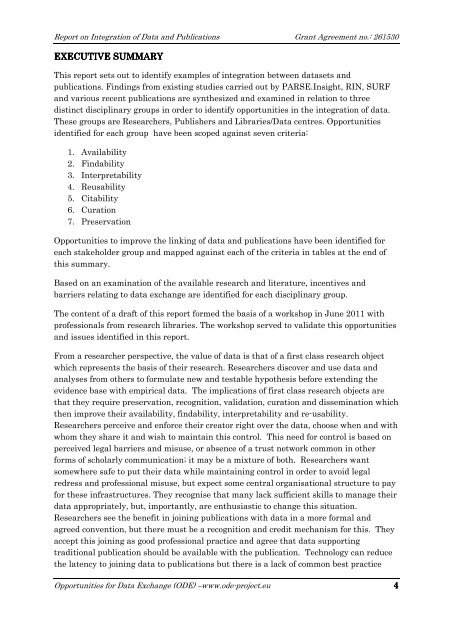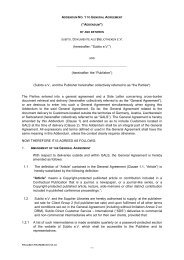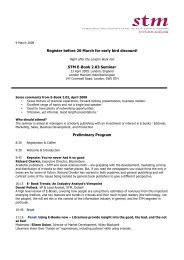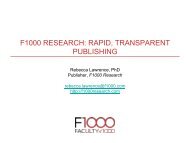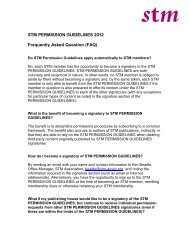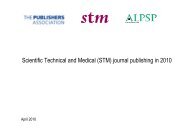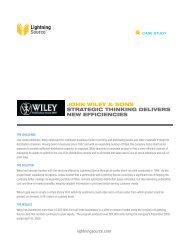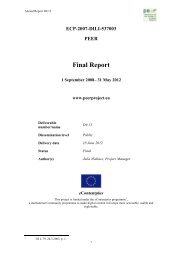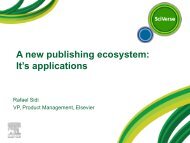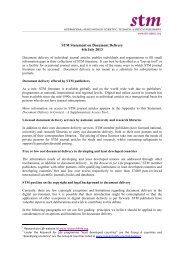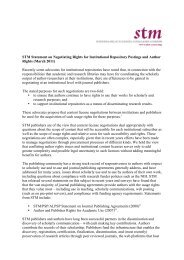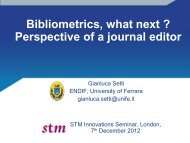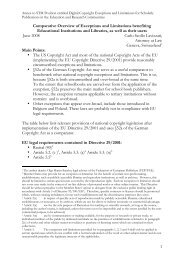Integration of Data and Publications - Alliance for Permanent Access
Integration of Data and Publications - Alliance for Permanent Access
Integration of Data and Publications - Alliance for Permanent Access
You also want an ePaper? Increase the reach of your titles
YUMPU automatically turns print PDFs into web optimized ePapers that Google loves.
Report on <strong>Integration</strong> <strong>of</strong> <strong>Data</strong> <strong>and</strong> <strong>Publications</strong> Grant Agreement no.: 261530<br />
EXECUTIVE SUMMARY<br />
This report sets out to identify examples <strong>of</strong> integration between datasets <strong>and</strong><br />
publications. Findings from existing studies carried out by PARSE.Insight, RIN, SURF<br />
<strong>and</strong> various recent publications are synthesized <strong>and</strong> examined in relation to three<br />
distinct disciplinary groups in order to identify opportunities in the integration <strong>of</strong> data.<br />
These groups are Researchers, Publishers <strong>and</strong> Libraries/<strong>Data</strong> centres. Opportunities<br />
identified <strong>for</strong> each group have been scoped against seven criteria:<br />
1. Availability<br />
2. Findability<br />
3. Interpretability<br />
4. Reusability<br />
5. Citability<br />
6. Curation<br />
7. Preservation<br />
Opportunities to improve the linking <strong>of</strong> data <strong>and</strong> publications have been identified <strong>for</strong><br />
each stakeholder group <strong>and</strong> mapped against each <strong>of</strong> the criteria in tables at the end <strong>of</strong><br />
this summary.<br />
Based on an examination <strong>of</strong> the available research <strong>and</strong> literature, incentives <strong>and</strong><br />
barriers relating to data exchange are identified <strong>for</strong> each disciplinary group.<br />
The content <strong>of</strong> a draft <strong>of</strong> this report <strong>for</strong>med the basis <strong>of</strong> a workshop in June 2011 with<br />
pr<strong>of</strong>essionals from research libraries. The workshop served to validate this opportunities<br />
<strong>and</strong> issues identified in this report.<br />
From a researcher perspective, the value <strong>of</strong> data is that <strong>of</strong> a first class research object<br />
which represents the basis <strong>of</strong> their research. Researchers discover <strong>and</strong> use data <strong>and</strong><br />
analyses from others to <strong>for</strong>mulate new <strong>and</strong> testable hypothesis be<strong>for</strong>e extending the<br />
evidence base with empirical data. The implications <strong>of</strong> first class research objects are<br />
that they require preservation, recognition, validation, curation <strong>and</strong> dissemination which<br />
then improve their availability, findability, interpretability <strong>and</strong> re-usability.<br />
Researchers perceive <strong>and</strong> en<strong>for</strong>ce their creator right over the data, choose when <strong>and</strong> with<br />
whom they share it <strong>and</strong> wish to maintain this control. This need <strong>for</strong> control is based on<br />
perceived legal barriers <strong>and</strong> misuse, or absence <strong>of</strong> a trust network common in other<br />
<strong>for</strong>ms <strong>of</strong> scholarly communication; it may be a mixture <strong>of</strong> both. Researchers want<br />
somewhere safe to put their data while maintaining control in order to avoid legal<br />
redress <strong>and</strong> pr<strong>of</strong>essional misuse, but expect some central organisational structure to pay<br />
<strong>for</strong> these infrastructures. They recognise that many lack sufficient skills to manage their<br />
data appropriately, but, importantly, are enthusiastic to change this situation.<br />
Researchers see the benefit in joining publications with data in a more <strong>for</strong>mal <strong>and</strong><br />
agreed convention, but there must be a recognition <strong>and</strong> credit mechanism <strong>for</strong> this. They<br />
accept this joining as good pr<strong>of</strong>essional practice <strong>and</strong> agree that data supporting<br />
traditional publication should be available with the publication. Technology can reduce<br />
the latency to joining data to publications but there is a lack <strong>of</strong> common best practice<br />
Opportunities <strong>for</strong> <strong>Data</strong> Exchange (ODE) –www.ode-project.eu 4


